This is a detailed gear list of all the equipment my partner and I brought for our six months in the boreal forest survival expedition along with feedback notes of what worked well and what I would do differently. I imagine someone packing an INCH bag, Bug Out Bag, or planning a survival expedition will find my feedback very useful.
The reasoning for our gear choices was based on our previous outdoor experiences as well as cost and what we already had available. In hindsight many choices were big mistakes, but many were bang on as well.
*My feedback is for what I would do for another six month expedition in the boreal forest. Going for a full year would require a different approach.
![180 Day Survival Expedition Gear List [what Worked, what Didn’t]](https://survivalskills.guide/wp-content/uploads/2017/10/rock-beach-view-800-600x450.jpg)
View from our camp
Bushcraft Gear
| Equipment | Feedback | QTY and Model |
| Bushcraft Knife | Excellent, 1 bright colored knife was our go-to knife for filleting, skinning, carving and everyday tasks. The knife is not very secure in its sheath so I was worried of loosing it. I’ve solved that now by using a piece of inner tube to secure the knife. | 1 X Morakniv Companion Stainless Steel |
| Survival Knife | Almost didn’t use it. It was inefficient for the majority of tasks; we used the bushcraft knife and hatchet instead. I thought of it as our back-up in case we lost our other tools. Click here to read my opinion on survival knives. | 1 X Gerber LMF II |
| Hatchet | We used it every day for chopping wood and dispatching catfish. We managed to cut really thick logs for the tripod over our tent, although it did take a long time. I think it was an excellent tool to have.
If I were staying through the extremely cold winter I would definitely bring a full length axe instead. |
1 X Schrade SCAXE 2 |
| Sharpener | We used it every week or so to sharpen our hatchet and knife. It is very lightweight and versatile. Definitely a keeper. | 1 X DMT FWFC Double Sided Diafold |
| Saw | We didn’t bring a saw, and we didn’t really need it. I would bring a saw only if I was going to build a cabin. Read here for more on axe vs. saw. | |
| Multi-tool | Excellent choice,we used it’s pliers all the time for picking pots from the fire, getting hooks unstuck from the bellies of fish, making hooks out of wire and sharpening them with its file. I used its saw to cut a thick plastic barrel, and that was nearly impossible to do with the hatchet. | 1 X Leatherman Wave |
| Knife Honer | 4 inch knife honer, but never used it. | |
| Lighter | 3 mini bic lighters; two of them were already half empty. Half-way, one of our lighters run out of fuel. We started fires with a fresnel lens as much as possible after that. We kept one lighter stashed away only to be used for an emergency.
We should have brought at least 3 full lighters for the 6 months. |
3 x Mini Bic |
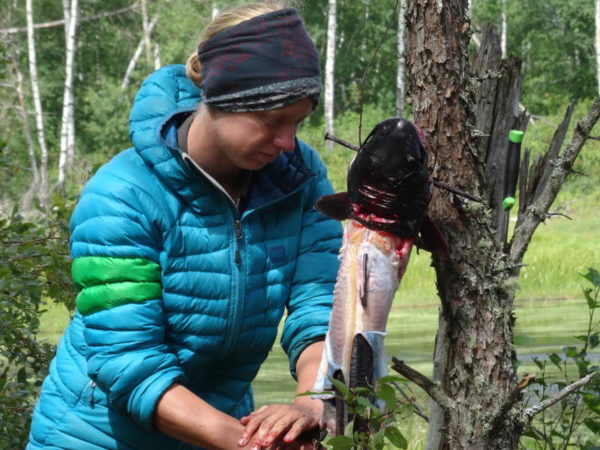
My partner skinning our staple food.
Camping Gear
| Equipment | Feedback | QTY total and Model |
| Tent | 2 person MEC backpacking tent very similar to the MSR Elixir 2. It is not an ultra lightweight tent, but because we canoed in it didn’t matter much. | 1 |
| Sleeping Bag | 2 MEC down bags rated to 20°F. My bag was very worn pre-trip. I slept cold in June because my bag had lost its loft. Moisture accumulates in down after sleeping there for weeks. In the last three months we were cold and had to sleep with many clothes on.
I would definitely choose a synthetic insulated bag with an EN rating of comfort past the minimum temperature I would encounter. For example if I expect the coldest night to be 20°F, I would bring a bag with a comfort EN rating of at least 10°F because under food deprivation your body slows its metabolism and gets cold. |
2 |
| Sleeping Pad | My heavily used NeoAir Xlite pad delaminated and slowly leaked for the last month. I had to reinflate it sometimes 3 times through the night. I could never find the leak. My partner brought a Klymit Static V2; it got punctured in 3 spots but she successfully repaired it. Near the end she broke the valve but found a way to still keep it inflated.
A closed cell foam pad like the Z lite would have been the way to go for maximum reliability. |
1 x NeoAir Xlite
1 X Klymit Static V2 |
| Mattress Coupler | It was nice to have a couple kit to join our sleeping pads together. I would definitely bring one again or find a lighter method of joining two pads together. | 1 X Therm-a-Rest Universal Couple Kit |
| Mosquito Shelter | Our big mosquito shelter wasn’t used for more than a week. We wore head nets, long sleeve shirts and pants for bug protection. I wouldn’t bring it again. | 1 X Onsight Big Box Shelter |
| Poncho Tarp | We ended up using my poncho tarp to cover the roof of our lean-to shelter, but it was too small.
I would bring a bigger sil-nylon tarp |
1 X Poncho Tarp |
![180 Day Survival Expedition Gear Feedback [what Worked, what Didn’t]](https://survivalskills.guide/wp-content/uploads/2017/10/poling-600x450.jpg)
Poling our canoe while ricing, notice my ripped pants.
Clothing
| Equipment | Feedback | QTY and Model |
| Hat | I love the OR cap that I brought; it worked well under my rain jacket hood when raining. My partner brought an OR gore-tex rain hat that she sometimes found too hot.
I would only bring a gore-tex hat if the location is a rain forest. |
1 x OR Swift Hat |
| Rain Jacket | My Arc’teryx 2-layer, paclite Gore-Tex jacket worked great but delaminated by the end.
I would bring a 3-Layer waterproof Shell of at least 40 denier fabric with zip vents. |
2 x Arc’teryx 2-layer Gore-Tex Jacket |
| Mosquito Head Net | We used them over our hats. They were a lifesaver. | 2 x Onsigth Bug Head Nets |
| Mosquito Jacket and Pants | I considered bringing a bug jacket and pants, but they are fragile, warm, and uncomfortable. I’m glad we didn’t bring them, they are useless. It’s better to wear loose long-sleeve shirt and pants. | 0 |
| Long Sleeve Shirt | Our loose fitting MEC shirts (similar to this one) worked great. I would use it unbuttoned and with the sleeves rolled up in hot days. They prevented bugs from biting us. | 2 |
| Convertible Pants | My heavily used convertible pants ripped a lot, and I had to patch them multiple times over both knees and in the back.
I would sew abrasion resistant fabric to the knees, gluteus, and gaiter areas. |
Prana Stretch Zion Convertible |
| Belt | Nylon belt that I had to adjust many times to keep up with my lost weight. | 1 |
| Running Shorts | I only used my running shorts when washing my pants. I also used them to cover the holes when my pants ripped and I had no motivation or materials to repair them. My partner also used them to protect her pants from getting ripped
I wouldn’t bring them again. |
2 |
| Rain Pants | My very worn rain pants ripped from the seams.
I would bring the same pants in new condition or similar. |
40 denier 2.5 layer Pertex pants |
| Sandals | We both had Keen sandals. Mine broke (they were worn before trip) but I repaired them with epoxy. | 2 x Newport H2 |
| Warm Jackets | Light fleece jackets and down jackets, but we were still cold.
I would bring more fleece jackets that wouldn’t compress like down does if using it when sleeping, maybe even a heavy fleece jacket like this one. |
2 x Fleece Jackets
2 x Down Jackets |
| Gloves | Light gloves like these, and 3mm neoprene gloves like these. The neoprene gloves aren’t very sturdy but work great in rain and when wet.
Unfortunately in October our hands were too cold. I would bring warm mitts for cold weather even if not staying for the winter. |
3 x gloves |
| Tubular Bandana | I had two bandanas that I used as a neck gaiter and hat.
I would bring a fleece neck gaiter in addition to the Buffs. |
4 x Buffs |
| Sunglasses | Not needed, my partner used them though | 1 |
| Running Shoes | R regular running shoes for everyday use. I mostly wore sandals, but in September I started to use socks and shoes for the cold.
The last weeks of our adventure were very cold. I would definitely bring Overboots for the cold Fall days. |
2 |
| Socks | Two pairs of socks worked well for the most part, I mostly wore only sandals anyway. In the fall I would have appreciated thicker, longer socks. | 4 |
| Underwear | I brought one pair of underwear similar to this. My partner brought 3. | 4 |
| Warm Hat | We didn’t bring a warm beanie, and we regretted it. I would definitely bring a double layer fleece beanie. | 0 |
| Base Layer | My partner brought base layer pants, but other than those we didn’t bring any base layers.
We would definitely bring both top and bottom layers. |
1 |
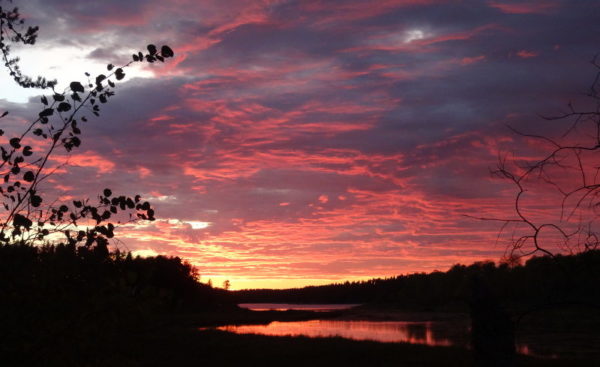
Electronics
| Equipment | Feedback | QTY and Model |
| Smartphone | Two iPhones in Lifeproof waterproof cases loaded with topo maps, ebooks, and satellite imagery.
I would bring a larger waterproof smartphone that uses sd cards for added storage like the Samsung S5 Neo in a waterproof case. Check my article on making your smartphone a survival tool. |
2 x iPhone 4s and 5 |
| e-reader | An iPad mini 2 in a waterproof case. It worked great, but I would just bring large screen smartphones instead. | 1 x iPad |
| Solar Charger | Our Power Monkey Extreme charger broke (we had already broke one and exchanged it before). Our other charger a Solar JOOS Orange worked very well. And was able to charge all our electronics.
I would bring at least the JOOS solar charger and a solar panel charger like the Suntactics S5. |
1 x Power Monkey Extreme
1 x Solar JOOS |
| Camera | My 30x zoom point and shoot worked well for us. | 1 x Sony DSC-HX50V |
| Sd cards | The sd cards we brought added to 100 GB in capacity.
I wish I had brought more sd cards to be able to take more videos |
|
| Camera batteries | We had two rechargeable batteries for the camera, it was great to have two because some days there was no sun to charge the camera. | |
| Satellite Messenger | It was a luxury to be able to message our family and friends, and actually know if our message was sent successfully. Nevertheless, sometimes we didn’t receive incoming messages. It also froze for a week until it ran out of battery and we were able to recharge it and use it.
Our no news is good news system worked. |
1 x Delorme inReach SE |
| 2x Cables | To be redundant I brought two cables per device in case one cable malfunctioned, for that has happened to me before. | |
| Waterproof camera | GoPro Hero but barely used it because we mostly took pictures not video.
I wouldn’t bring one again unless I was making a short film. |
1 x GoPro |
| Personal Locator Beacon | small PLB in case our satellite messenger failed because satellite communications are not entirely reliable especially in bad weather. | 1 ACR ResQlink |
| Headlamps | Rechargeable headlamp and my partner brought a battery operated headlamp. They worked well but my lamp is not waterproof
I would bring a waterproof AA headlamp that can be dimmed very low to conserve batteries like the Manker E03H with USB rechargeable AA batteries and regular batteries just in case. |
1 x Petzl Tikka w/rechargeable pack
1 x Petzl E+lite |
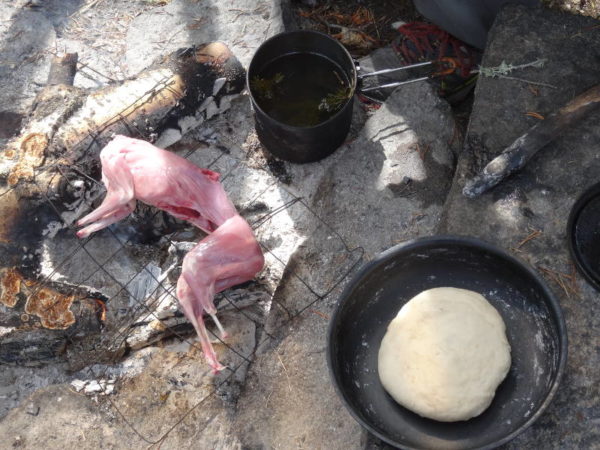
Rabbit, spruce tea and bread for breakfast
First Aid
| Equipment | Feedback | QTY and Model |
| Antibiotics | Cephalexin (Keflex) 500mg to prevent a bacterial infection in case of a big, dirty cut. | |
| First Aid Kit | As a base we used a weekender kit and added a few items to complement it. We ended up using only duct tape and and band aids for minor cuts and blisters. | 1 x Mountain Series Weekender |
| Skin Stapler | Using a skin stapler in the field is quite risky but we wanted to have the option. | 1 |
| Israeli Bandage | We didn’t bring israeli compression bandage but I would like to add it to my kit. | 0 |
| Instant Glue | Instant glue works great for closing small cuts. | 1 |
| Pain Relief Pills | Ibuprofen 200mg pills for headaches and minor pain, ratio-Lenoltec #3 for mild to moderate pain, Ketorolac tromethamine as a non steroidal anti-inflammatory, acetaminophen (Tylenol) 650mg for pain relief | |
| Splint | The kit was complemented with a 36-inch splint in case of a broken bone. | 1 x SAM splint |
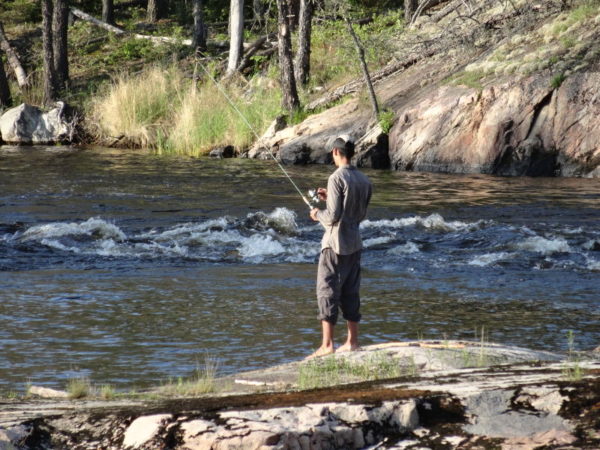
Fishing
| Equipment | Feedback | QTY and Model |
| Fishing Rod | One medium to light fishing rod. It broke a few times from the tip, but I fixed it with braided line and epoxy.
I would bring two telescoping rods instead to double our chances of catching fish. If I had money to spare I would consider an Emmrod packer. |
1 |
| Line | 6lb mono line and a small roll of 50lbs braided line. Mono line only worked for fishing and it broke in below freezing temps.
I would bring 8-10lb mono for fishing, and 300 yds of 20lb and 300 yds of 40lb braided line for trotlines, fishing in cold weather and as general purpose cord. |
1 |
| Hooks and Jigs | Assorted tackle and about 40 hooks in total, mainly jigs. We had to minimize using our rod to prevent losing all our hooks, this was a great problem.
I would bring at least 80-100 jigs along with 100-120 medium treble hooks for trotlines. |
40 |
| Lures | Four lures and lost all of them.
I would bring about 8-10 lures. |
4 |
| Retrieving Net | We didn’t bring a retrieving net or landing net, but I made one using braided line. When fish is your main source of food you don’t want to lose a fish.
I would bring extra line to make a net or just bring the net part already made. |
0 |
| Gill Net | We didn’t bring a gill net.
I would definitely bring 2 gill nets. |
0 |
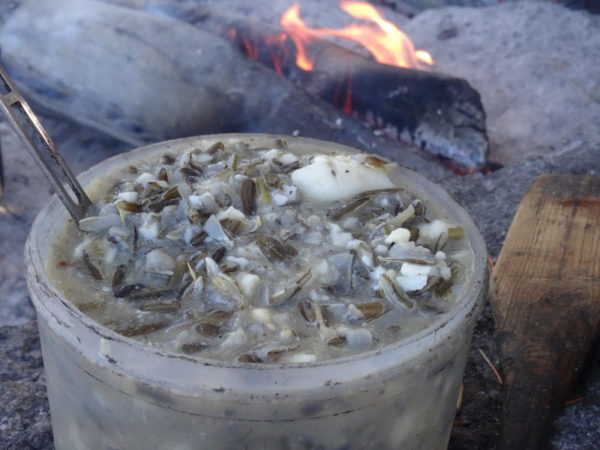
Wild rice and catfish
Cooking and Food
| Equipment | Feedback | QTY and Model |
| Eating utensils | Titanium and plastic forks and spoons.
I would bring only flexible plastic ones for use inside our pots and pans. |
4 |
| Pot w/lid | Two 1L tall pots with metal lids. The plastic from the handles burnt, but they worked.
I would bring two 1L wide pots with a metal handle and a tight fitting lid like the MSR alpine pot. I might also consider a 1.5L pressure cooker for a longer expedition. |
2 |
| Water Bottle | Two plastic wide mouth bottles, and they were great to have.
I would bring metal bottles if I was staying through the winter. |
2 |
| Dutch oven | Didn’t bring too heavy
I think the MSR alpine pot would work similarly. |
0 |
| Food containers | We used 16oz Nalgene containers as bowls, plates, tiny cutting board and for storing leftovers. They work great. | 2 |
| Pan | We used a a camping pan to cook fish and bake bread over the fire. It was great to have. | 1 |
| Iodized Salt | 1 kg of salt but used only half a kg in 6 months.
I would bring pepper, and spice mixes. We really missed spices. |
|
| Honey | It was great to have and very versatile for baking. | |
| Whole Wheat flour | Baking kept us happy. | |
| Whole Milk Powder | Excellent source of fat and protein | |
| Yeast | Excellent choice, baking entertained us | |
| Baking powder | Excellent choice, see above | |
| Olive oil blend | For its fat and for cooking. | |
| Basmati Rice | We brought less than 90kgs of food in total (mainly rice and flour), adding to 1180 calories per person, per day. | |
| Water Purification Tablets | water purification tablets but never used them.
I wouldn’t bring them again. |
20 |
| Used Food Buckets | Used food grade buckets served as a waterproof container for our rations although after they fell in the river we discovered that some water leaked in. They also served as stools, to keep fish through the night and to hang food with a bear hang. | 6 |
| Leather glove | We didn’t bring a leather glove but it would have been nice to have for cooking. | 0 |
| Bear bags | We used kevlar bags as a multi use item and as a light weight bear proof food storage. | 3 |
| Bear hang | We built a bear hang for our food with a biner, pulley and paracord.
I would bring an ultralight pulley and a carabiner instead. |

We didn’t eat this one, just some of its friends
Hunting
| Equipment | Feedback | QTY and Model |
| Shotgun | A 20 gage shotgun in case of a dangerous wildlife encounter with a bear or moose. But we didn’t need it.
I would take either a flare gun, a flare, or a bear banger instead. (probably shoot the bear with a bow) |
1 |
| Oil f/shotgun and ammo | Shotgun not needed. We brought slugs, and plastic slugs as a bear deterrent. | |
| Shotgun case | We wrapped the shotgun in multiple garbage bags for the canoeing portion of the trip. | |
| Paracord | The 300ft of paracord was great to have.
I would bring 200 ft of paracord and 200ft of bank line as well |
|
| 20 gage snare wire | Fish was our staple, we weren’t successful trapping small mammals. I think 20 gage snare wire is extremely overestimated as a trapping tool.
I would consider steel traps or conibear traps instead but only if I were staying a full year. |
|
| Arrows | 12 carbon fiber, feathered arrows was enough | 12 |
| Bow | 50lb takedown recurve bow but the limbs broke because I didn’t bring a stringer.
I would bring a 45 lb Survival Bow. Current folding survival bows don’t have a comfortable grip. |
1 |
| Arrow Tips | 3 broad head arrow points, 6 judo points, and 12 practice points. | |
| Hunting Belt quiver | The quiver I brought was heavy and bulky, it was specially awkward to bushwhack with it..
I would consider a bow mounted quiver. |
1 |
| Monocular | waterproof monocular.
It was nice for observing wildlife. |
1 |
| Hydration pack | I had a 2L hydration pack that was good to have for day trips and bushwhacking. It started leaking after the temperature dropped and a connector broke (it was empty).
I would bring a 10L durable daypack instead and carry a plain water bottle. Hydration packs are not durable. |
1 |
| Backpack | I had a 30L daypack that mainly used for storing stuff.
I wouldn’t bring it. |
1 |
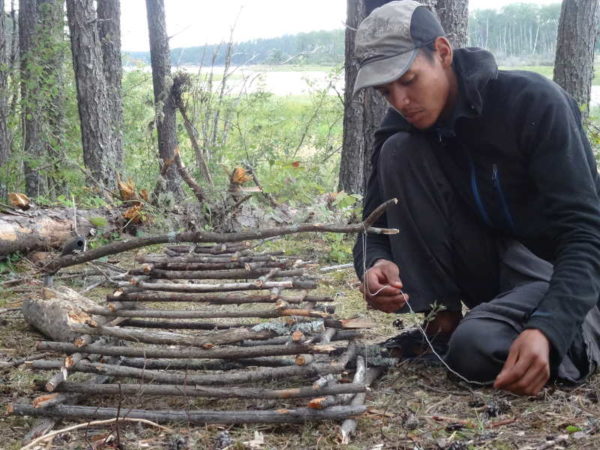
Hygiene
| Equipment | Feedback | QTY and Model |
| Soap | 1 bar of soap that we used sparingly. | 1 |
| Toothpaste and Toothbrush | Having both toothpaste and toothbrush was nice.
We could do with charcoal and a toothbrush, but charcoal doesn’t smell nice. |
Miscellaneous
| Equipment | Feedback | QTY and Model |
| Ziploc Bags | We used the ziploc bags where we wrapped our rations to store fish meat. | 1 |
| Waterproof Notebook | waterproof notebook to write my journal.
I would bring a notebook with more pages. |
1 |
| Pencils and pen | NASA invented the space pen, Russia just used pencils. | 2 |
| Survival Kit | We had a small survival kit in our PFDs, in case we lost our canoe and equipment. I ended up using the fresnel lens a lot to start fire. | 2 |
| Garbage bag | Excellent multipurpose. We used it as a layer where we could make fruit leather out of berries as well as using it to line the buckets where we stored wild rice. | |
| Whistles | Whistles are required by law for canoeing. We used them a few times to communicate when separated. | 2 |
| Sunscreen | My partner brought and used one bottle of sunscreen for her face. I I never used it. | 1 |
| Bug Spray | DEET in cream and spray but never used it, preferred to wear pants, long sleeve shirt and headnet. It stinks.
I wouldn’t bring it. |
2 |
| Bear Spray | We never used bear spray as a deterrent but it was good to have the option.
I would probably just bring bear bangers (lighter). |
1 |
| Cash | Used it to buy extra hooks at fly-in fishing lodge. You never know when cash can come in handy, even at the edge of the world. |
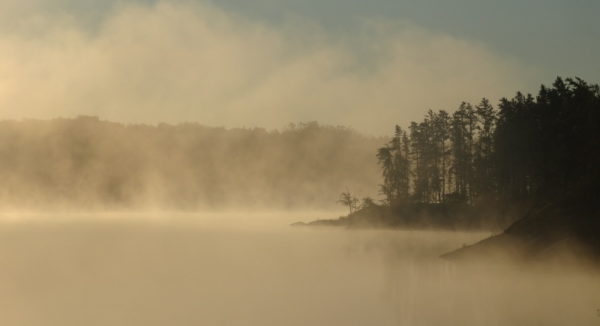 Navigation
Navigation
| Equipment | Feedback | QTY and Model |
| Mirror Compass | I used my compass to bushwhack using bearings, it was also nice to be able to see my face every once in awhile. | 1 |
| Map case | The HP map case is completely waterproof and we used it to protect electronics and maps. | |
| Topo map | We had a plastic (waterproof) topographic map of the general area. |
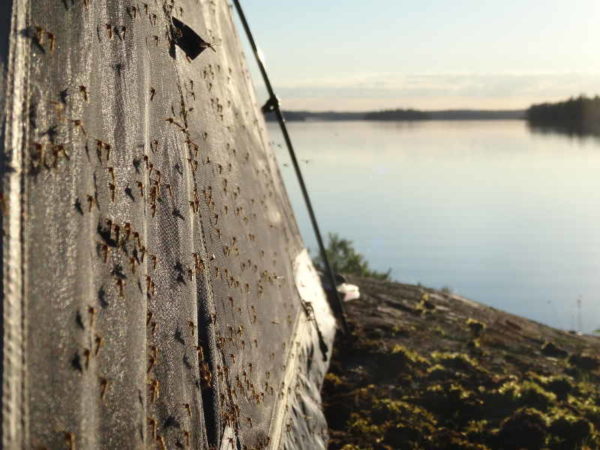
Repair
| Equipment | Feedback | QTY and Model |
| Duct Tape | Great to have. | 1 |
| Wire | I made a grill out of it, and also a few hooks. | |
| Epoxy | cold cure epoxy for canoe repairs but worked for fixing my shoe.
I would add rubber cement for fabric and shoe repairs. |
|
| Dental Floss | Unwaxed dental floss for small repairs and sewing. | |
| Sewing Kit | Sewing kit with various needles and thread.
I should have brought pieces of fabric for patches as well as needles of different sizes |
|
| Zipties | Great to have, but didn’t need them |
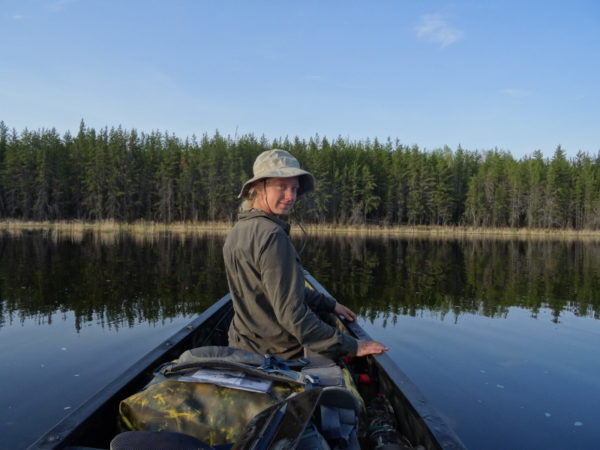
Canoeing
| Equipment | Feedback | QTY and Model |
| Paddles | Cheap plastic/aluminum paddles with a T-grip. They are tougher than a wooden paddle. Worked great | 2 |
| Bailer | We cut a bleach bottle, it turned out to be an excellent multi-use item. | |
| Dry bags | A 20 liter dry bag. Great for keeping our everyday gear dry. | 1 |
| Portage Packs | We brought a 115 liter and a 70 liter MEC portage packs, very similar to this. | 2 |
| Painter | Floating line for lining and tying our canoe. | 1 |
| Yoke pad | The Level Six yoke pad makes all the difference in the world for portaging a heavy canoe. Every canoe tripper should have it. | 1 |
| PFD | We had two Bahia PFD because it’s mandatory, but only used them when running rapids. | 2 |
| Canoe | Old Town Royalex 16ft Prospector canoe. They don’t make them like that anymore. This is as close as you can get. | 1 |

![180 Day Survival Expedition Gear List [what Worked and Didn’t]](https://survivalskills.guide/wp-content/uploads/2017/10/morning-777x437.jpg)
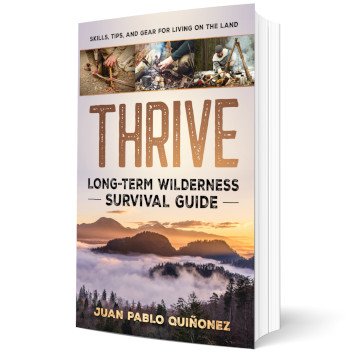
Thank you very much for the list and comments about each item. It is very helpful getting the full story of what was used and how it worked out. One pro tip I’ve read – the zip lock baggy seams for long term use should be reinforced with duct tape edges so to help keeping them from splitting.
Did you have aluminum foil on your trip ? I may have missed it.
Thanks again for the list.